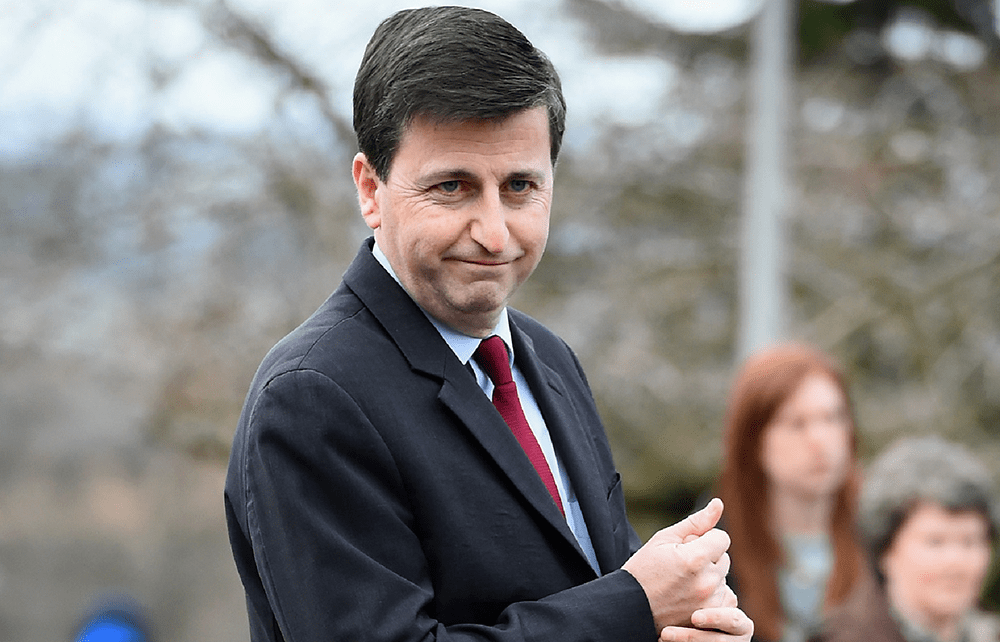It’s a sunny Friday afternoon in Gullane, an affluent seaside town on the Firth of Forth. For political campaigners, golden hour is the perfect time to speak to middle-class locals working from home at the end of the week. A huddle of Labour campaigners go door to door, ticking off names on a clipboard and shouting numbers to one another. ‘Eight,’ says one canvasser, smiling. She’s reporting back an undecided voter’s answer to the question ‘From one to ten, how likely are you to vote Labour on July 4?’
‘We are getting a lot of
“I have always voted SNP but am now voting for you”’
The candidate is Douglas Alexander, a former cabinet minister and one of several veterans of the last Labour government who hopes to return to frontline politics next month. Alexander was MP for Paisley and Renfrewshire South before he became a victim of the 2015 Scottish Labour wipeout which left Scotland with just one Labour MP: Ian Murray in Edinburgh South. Things were so dire that one year the depleted Scottish Labour party held its Christmas party in a corridor.
Scottish Labour is now on the brink of a resurgence that would help Keir Starmer reach No. 10 and potentially see its leader Anas Sarwar take power in the 2026 Scottish elections. One poll suggests Labour will win 34 Westminster seats, thereby once again becoming the largest party in Scotland. Top of the list of winnable seats is East Lothian, for which Douglas Alexander is now standing.
I grew up in this constituency, in the town of North Berwick, which recently topped a poll of the best places to live in Britain. It is – according to the Sunday Times – the kind of place where ‘you can feel grounded as well as upwardly mobile’, which suits Alexander well.
At one of the semi-detached houses we visit, a woman explains she was a loyal SNP voter until two years ago but ‘they are making an arse of it’ so she’s going to vote Labour. ‘We are getting a lot of “I have always voted SNP but am now voting for you”,’ says one local campaigner. ‘Then you will go a door down and it will be “I have always voted Conservative, now I am voting for you”.’
It’s quite a nationalistic area: almost two-thirds of people say they are Scottish but not British. Such attitudes have meant the seat has fallen into the SNP’s hands twice since 2010. But Labour hopes to pick up two sets of protest votes: from those annoyed with nationalists in Edinburgh and with Tories in Westminster. The main snag in this plan is a feeling that Keir Starmer will impose more taxes. ‘Maybe think about dropping the school fee thing and I’ll think about it,’ says a woman in her forties.
As a teenager, Alexander won a scholarship to Pearson College, an elite private school in Canada which specialises in training tomorrow’s world leaders. He has been putting such training to use in recent years, as a fellow at Harvard and later a chair of Unicef UK. Why is he returning to politics now? ‘I’ve been very struck, when I’m abroad, by the frequency with which people say, “What’s happened to the UK? We thought you were a serious country!”’ he tells me. ‘Whether it was Boris Johnson and partygate, or Liz Truss and the fateful 49 days of her premiership, I just had a sense that we need a Labour government to stop the rot.’
Alexander was a protégé of Gordon Brown (both are sons of Church of Scotland ministers) and he served as a secretary of state for transport, for Scotland and for international development. Now aged 56, if he wins his seat he’ll be returning as one of the few Labour MPs with cabinet experience.
There are already reports that he could be put on the fast track back to the top, perhaps leapfrogging David Lammy to become foreign secretary. Such talk irks Lammy’s supporters (‘Pushing out a black politician from a great office of state would be unthinkable,’ says one Blairite). What does Alexander make of such rumours? ‘Just rubbish,’ he says. ‘Unhelpful, distracting rubbish when all of us are focused on winning power for Labour.’
While East Lothian should be a walk-over, the party also expects other victories across Scotland. Torcuil Crichton, the former political editor of the Daily Record, is tipped to take the Outer Hebrides, known as Na h-Eileanan an Iar. Labour’s biggest test will be whether it can reconquer its former stronghold of Glasgow by winning back working-class voters who defected en masse to the SNP after the 2014 independence referendum. ‘When the Conservatives win in Westminster, a lot of people vote SNP to make a point,’ says one candidate. ‘Now it’s different, we look like we could win – the SNP have had a torrid few years and our voters are coming back.’
The Scottish Conservatives hope to pick up some SNP seats in the north-east, but they ran into trouble this week after Douglas Ross, MP for Moray, said he’ll stand down as Scottish Tory leader after the election. There has also been uproar in his party about who should stand for where after the boundary review and accusations that Ross used underhand tactics to take a seat from an ill colleague. ‘The whole thing stinks,’ says one Scottish Tory. ‘There is no love for Douglas.’ The SNP, meanwhile, will be relieved if they make it to polling day without Nicola Sturgeon facing further questions from the police in the continuing investigation of the allocation of party funds.
As the SNP and the Conservatives air their dirty laundry, it is Sir Keir and his army of Starmtroopers who could be the biggest winners. And the MPs in this Scottish wing could prove to be some of the most independent–minded in Labour’s new intake. ‘The mistake some of us made in the past was to get to Westminster and forget about our roots. That won’t happen this time,’ says one candidate. ‘We will be loyal to Scotland and our constituents, first and foremost.’








Comments